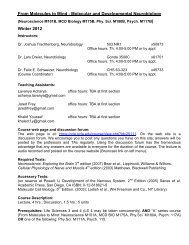Psychological Statistics - Courses in Psychology - UCLA
Psychological Statistics - Courses in Psychology - UCLA
Psychological Statistics - Courses in Psychology - UCLA
You also want an ePaper? Increase the reach of your titles
YUMPU automatically turns print PDFs into web optimized ePapers that Google loves.
As you will learn <strong>in</strong> the course, the distribution of scores can be described <strong>in</strong> a standardized<br />
way. A Z-score is a standardized score which <strong>in</strong>dicates how far a particular score is away from<br />
the mean (or average) score <strong>in</strong> terms of standard deviations (a measure of how wide a<br />
distribution is). Exam scores that are above the mean will have a positive Z-score, exam scores<br />
below the mean will have a negative Z-score. Your average Z-score on all the exams will<br />
determ<strong>in</strong>e your grade. The f<strong>in</strong>al exam will count twice as much as the other exams <strong>in</strong> this<br />
average. Below is the correspondence between the average Z-score and the grade you will<br />
receive. Next to the Z score is the approximate % of the class that will get that grade.<br />
Average Z-score Grade Approximate % of class receiv<strong>in</strong>g score<br />
>1.30 A 10<br />
>0.85 A- 10<br />
>0.55 B+ 10<br />
>0.25 B 10<br />
>0.00 B- 10<br />
>-0.25 C+ 10<br />
>-0.85 C 20<br />
>-1.30 C- 10<br />
>-1.70 D 5<br />

















